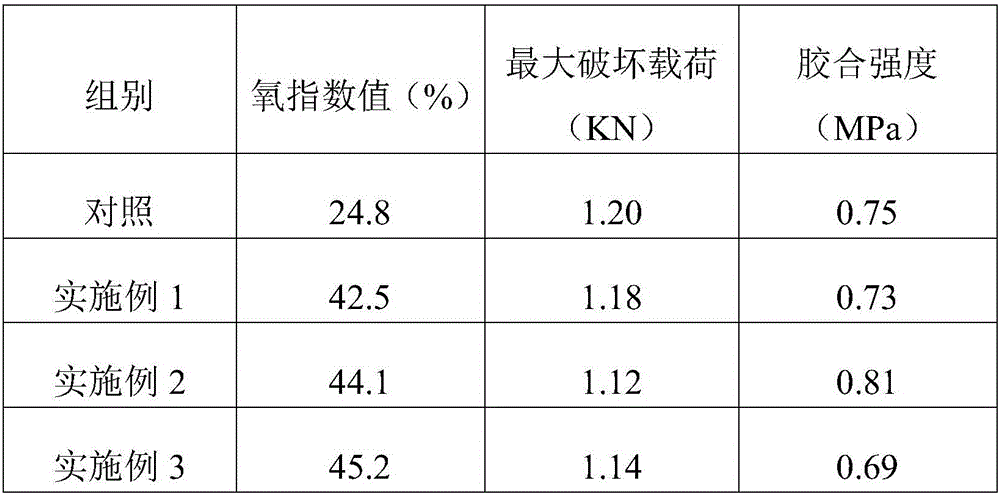Wood flame retardant and application thereof
A fire retardant and wood technology, applied in wood treatment, impregnated wood, wood impregnation, etc., can solve the problems of plywood with great influence on mechanical properties, poor loss resistance and aging resistance, and inconspicuous flame retardant effect, etc., to achieve smoke suppression Environmentally friendly, good flame retardant effect, good smoke suppression effect
- Summary
- Abstract
- Description
- Claims
- Application Information
AI Technical Summary
Problems solved by technology
Method used
Image
Examples
Embodiment 1
[0026] A wood flame retardant, comprising the following raw materials in parts by weight: 25 parts of melamine, 30 parts of boric acid, 10 parts of zinc borate, 10 parts of sodium sulfate and 10 parts of sodium tripolyphosphate.
[0027] The preparation method of the described wood flame retardant comprises the following steps: weighing melamine, boric acid, zinc borate, sodium sulfate and sodium tripolyphosphate by weight, adding them into a pulverizer and pulverizing them to 120 mesh, and then mixing the components , and finally add water to prepare a wood flame retardant solution with a mass concentration of 10%.
[0028] The application of described wood flame retardant in the production of flame retardant fiberboard comprises the following production steps:
[0029] (1) Select a veneer with few knots and few defects, clean the surface, dry the veneer to a moisture content of 8%, and then soak it in a wood flame retardant solution with a mass concentration of 10% for 24 ho...
Embodiment 2
[0034] A wood flame retardant, comprising the following raw materials in parts by weight: 35 parts of melamine, 40 parts of boric acid, 15 parts of zinc borate, 20 parts of sodium sulfate and 15 parts of sodium tripolyphosphate.
[0035] The preparation method of the described wood flame retardant comprises the following steps: weighing melamine, boric acid, zinc borate, sodium sulfate and sodium tripolyphosphate by weight, adding them into a pulverizer and pulverizing them to 120 mesh, and then mixing the components , and finally add water to prepare a wood flame retardant solution with a mass concentration of 10%.
[0036] The application of described wood flame retardant in the production of flame retardant fiberboard comprises the following production steps:
[0037] (1) Select a veneer with few knots and few defects, clean the surface, dry the veneer to a moisture content of 10%, and then soak it in a wood flame retardant solution with a mass concentration of 15% for 24 h...
Embodiment 3
[0042] A wood flame retardant, comprising the following raw materials in parts by weight: 30 parts of melamine, 35 parts of boric acid, 12 parts of zinc borate, 15 parts of sodium sulfate and 12 parts of sodium tripolyphosphate.
[0043] The preparation method of the described wood flame retardant comprises the following steps: weighing melamine, boric acid, zinc borate, sodium sulfate and sodium tripolyphosphate by weight, adding them into a pulverizer and pulverizing them to 120 mesh, and then mixing the components , and finally add water to prepare a wood flame retardant solution with a mass concentration of 10%.
[0044] The application of described wood flame retardant in the production of flame retardant fiberboard comprises the following production steps:
[0045] (1) Select a veneer with few knots and few defects, clean the surface, dry the veneer to a moisture content of 9%, and then soak it in a wood flame retardant solution with a mass concentration of 12% for 24 ho...
PUM
 Login to View More
Login to View More Abstract
Description
Claims
Application Information
 Login to View More
Login to View More - R&D Engineer
- R&D Manager
- IP Professional
- Industry Leading Data Capabilities
- Powerful AI technology
- Patent DNA Extraction
Browse by: Latest US Patents, China's latest patents, Technical Efficacy Thesaurus, Application Domain, Technology Topic, Popular Technical Reports.
© 2024 PatSnap. All rights reserved.Legal|Privacy policy|Modern Slavery Act Transparency Statement|Sitemap|About US| Contact US: help@patsnap.com








